It Commenced With ‘Make your Mark’ in Manchester
In the annual ‘Make Your Mark’ youth ballot in Manchester, over 20,000 young people voted in favour of a curriculum that prepares them for life. Manchester City Council’s response to this request was to introduce the Skills for Life programme, which is a universal approach embedded into new and existing projects across schools and youth settings around the Manchester region.
What Exactly Are Skills for Life?
There are myriad definitions of ‘skills for life’ or ‘life skills’, but one which is universally accepted is the World Health Organization’s definition: “The abilities for adaptive and positive behaviour that enable individuals to deal effectively with the demands and challenges of everyday life“.
What Does This Mean?
Skills for life are key attitudes, aptitudes and behaviours which are believed to underpin success in education, personal life and the workplace. These social and emotional ‘soft’ skills or ‘character traits’ include the ability to respond to setbacks, think independently, work well with others, build relationships, communicate effectively, be able to use technology, convince and lead others, be creative, enjoy cultural experiences, manage emotions, and cope with difficult situations. With this in mind, schools should be preparing children for far more than just exams. In order to be happy and well-rounded, a person needs to be able to look after their physical and mental well-being and to deal with a broad range of experiences.
What Are Key Skills in Life?
There are many skills and models; UNICEF, UNESCO and WHO list ten core life skill strategies and techniques as:

Why Are they Important?
A wide range of skills is essential for people to flourish in adult life and achieve their potential, both in their daily existence and at work. These life skills allow young people to develop as human beings; building self-awareness, self-esteem and self-confidence, which are key tools for understanding strengths and weaknesses. As a consequence, an individual will have the interpersonal skills, confidence and motivation to be able to discern opportunities and face potential threats, which, in turn, leads to development of the social awareness of the concerns of family, friends and society.
All of this promotes mental well-being and competence in young people as they face the realities of life and empowers them to take positive actions.
Where’s the evidence?
- Skills for Flourishing
There are many studies which find that non-academic skills in childhood are strong predictors of adult outcomes:
- Self-control, self-perceptions and social skills are factors leading to positive effects in adult life, including employment, well-being, and physical and mental health
- Young children’s self-control skills, such as conscientiousness, self-discipline and perseverance, predict their health, wealth and criminal history in later life regardless of IQ or social background
- An 80-year longitudinal study by Robert Waldinger has linked individual happiness to good, positive friendships and relationships.
- Skills for the Workplace
There is also lots of evidence linking skills’ development to benefits in the workplace. Here are a few:
- Research from Harvard University has shown that, in the US, social skills are becoming more important in the workplace all the time. With increasing automation, it is the ability to show flexibility, creativity and teamwork that is increasingly becoming possibly more valuable than academic knowledge and technical skills
- A recent survey of employers on education and skills, the Confederation for British Industry’s (CBI) concluded that: “Businesses are clear that first and foremost they want to recruit young people with attitudes and attributes such as resilience, enthusiasm and creativity. They are not selecting simply on the basis of academic ability.”
- According to one of the world’s leading businessmen, Elon Musk: the main requirement for employment at his companies is “exceptional ability”. He adds, “I don’t consider going to college evidence of exceptional ability. In fact, ideally you dropped out…Did Shakespeare go to college? Probably not.”
- According to a special report on the world of work by the Financial Times; drawing on analysis from the World economic forum and the OECD, they show how the demand for different skills is changing as the world of work evolves. The demand for ‘soft skills’, such as critical-thinking and problem-solving is increasing and there is a shift away from manual, routine, unskilled labour towards the cognitive work which is not easy to automate. This fits in with societal trends, such as an ageing population and greater use of technology
What Are the Benefits of Learning Life Skills?
In summary of the above, there is lots of evidence to show that key life skills have strong correlations with positive life and work outcomes.
Numerous experimental studies of many programmes around the world, which have aimed at developing life skills, have concluded that the programmes produced positive effects, such as:
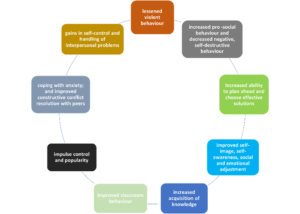
UNICEF supports this general conclusion: “There is strong evidence of LSE (life skills education) developing relevant knowledge, skills and attitudes among learners, both in thematic risk areas and general psychosocial skills. Life skills education is having an impact…”
So, How is Manchester Doing It?
Manchester City Council has the stated mission: “to ensure that children and young people have the right skills to be able to grow up happy, healthy, safe and successful”. They believe this can be achieved by creating a city-wide movement to embed Skills for Life across Manchester, promoting a common language and developing quick and easy-to-use resources.
Skills for Life is an approach which is applied to multiple settings and contexts, such as:

The foundation for Skills for Life is based upon research carried out by UK Youth Employment which reviewed 13 skill-based frameworks and 86 reports regarding young people, skills and employment. The five key skills chosen for the Skills for Life framework are:
- Communication
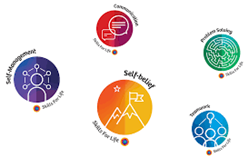
- Problem Solving
- Self-belief (this includes positive outlook, resilience and motivation)
- Self-management (includes accountability, organisation and initiative)
- Teamwork (includes leadership)
It is important that young people understand know when and where they are developing these vital skills and are exposed to these life skills at an early age so it is natural that they should also lie at the heart of the education system. As well as the secondary schools, colleges and academies, all primary schools in the Manchester district have been invited to be involved in the Skills for Life programme.
What Are the Benefits of the Council Running It?
The are a number of benefits from the council setting up and managing the programme:
- Reduced costs; by paying a flat fee the council can underpin the project at a reduced cost in aggregate for the schools in the borough. It is in their interests to onboard schools, colleges, youth providers and companies on to the platform
- Super-connectivity; the council is connecting pupils at all the schools and colleges in the region with skills opportunities, events, local youth groups and employers through Kloodle
- Activities; on their website the council provides tasks, lesson plans and exercises for all of the schools
- Consistency; having the same approach, activities and framework means there is a consistency which schools can communicate with each other about to determine best practice
- Opportunity; life skills programmes are linked to positive outcomes and social mobility, which is an important focus in an area with many inner city schools
What Are Examples of Activities to Develop Skills
Manchester Council wants Skills for Life to raise the profile of skills in the region and have provided ideas, lesson plans and resources to help local teachers in schools to achieve this:
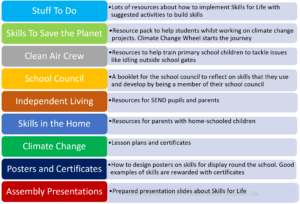
Schools Need to Raise the Profile of the Programme
Raising the importance in school is a simple four stage process:

Design posters to advertise Skills for Life activities and events. Announce in assemblies |
Use the skill terms in and out of the classroom and in all classes |
Use activities designed for purpose but also enrichment and other exercises |
Reinforce the lessons and skills learned. Use reflections on Kloodle profile to assess the benefits |
How Does Kloodle Fit In? Kloodle is the Facilitator
Kloodle is a digital platform where young people can identify, record and reflect on their skills development and the Skills for Life framework is the scaffolding for them to build and showcase their skills and character. Skills can be identified and developed through activities at school and also interactions with employers and youth providers in the region. Kloodle facilitates the superconnectivity powers of the council.
Any secondary school or organisation working with young people in the Manchester area can sign up to become a Skills for Life provider. To register, click the link here
Here is a step-by-step guide on how to register and the process of how it works.
As a Skills for Life provider, the school or organisation can use the resources to set challenges, assess skills-based outcomes and promote skills development to young people on Kloodle.
The rich experience and skills’ development from activities or enrichment at the school can be captured by being recorded on Kloodle during or after each lesson or activity.
Learners do this by uploading photos, videos, documents and blogs to their Kloodle profile, tagging in the skills they are honing as part of the activity. By downloading the Kloodle app to their phones, photos and posts about activities can be recorded quickly as they are completed. Students can make their own posts but, depending on ability and age, in some cases the teachers post on their behalf. The Kloodle software is very user-friendly and assistive, helping all levels of learners with these activities.
activities can be recorded quickly as they are completed. Students can make their own posts but, depending on ability and age, in some cases the teachers post on their behalf. The Kloodle software is very user-friendly and assistive, helping all levels of learners with these activities.
Reflection is a very powerful component of the process as young people think more deeply about identifying skills and then how to develop them, so personal reflections can be added to Kloodle after activities, when students consider how their skills have evolved.
And here are some real-life excellent examples of how students use Kloodle for reflections on work experience, community action and making presentations.
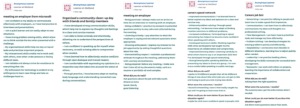
Each individual student has a skills wheel on their Kloodle profile, which illustrates the growth in skill development. The school uses the Skills for Life framework of values. By completing tasks, learners can identify how their aptitudes can grow their individual skills wheel. That feels good!
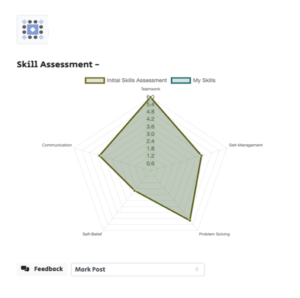 And this doesn’t just end when the learners leave school; ultimately, they can complete CV writing on Kloodle and keep their profiles for life!
And this doesn’t just end when the learners leave school; ultimately, they can complete CV writing on Kloodle and keep their profiles for life!
All of this builds self-awareness and confidence as the most important aspect is the skills are transferable.
And Finally….
The Skills for Life programme is an example of how Manchester City Council has  shown themselves to be proactive and progressive in listening to and supporting young people in their borough. Giving young people a voice fits in with the city’s status of ‘Candidate for Unicef Child-friendly City’. At Kloodle we are proud to be a part of that.
shown themselves to be proactive and progressive in listening to and supporting young people in their borough. Giving young people a voice fits in with the city’s status of ‘Candidate for Unicef Child-friendly City’. At Kloodle we are proud to be a part of that.
If you would like a demo of Kloodle please book it here: Calendar

